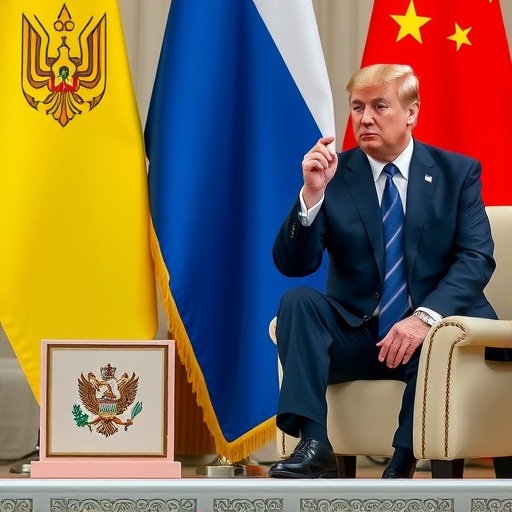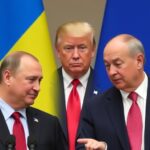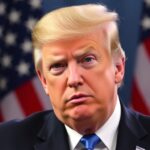Trump Abruptly Cancels Putin Summit in Budapest, Turns to China for Ukraine Peace Deal Breakthrough
In a stunning diplomatic pivot, former President Donald Trump has canceled a highly anticipated summit with Russian President Vladimir Putin scheduled for Budapest, Hungary, declaring that no meeting will occur without tangible progress toward a peace deal in Ukraine. Trump, positioning himself as a key player in international negotiations despite not holding office, simultaneously called on China to join forces with the United States in mediating an end to the Russia-Ukraine conflict. This bold maneuver underscores escalating tensions and Trump’s unconventional approach to global diplomacy.
- Trump’s Firm Stance: No Summit Without Ukraine Progress
- Ukraine’s Dire Situation Fuels Diplomatic Urgency
- China Enters the Fray: Trump’s Call for Beijing’s Mediation Role
- Global Reactions: Allies and Adversaries Respond to Trump’s Pivot
- Charting the Path Forward: Implications for U.S. Foreign Policy and Global Stability
Trump’s Firm Stance: No Summit Without Ukraine Progress
Donald Trump, the Republican frontrunner for the 2024 presidential nomination, announced the cancellation late Wednesday evening via a series of posts on his Truth Social platform. “I’m not wasting time on empty talks with Putin until there’s real movement on Ukraine,” Trump wrote, emphasizing that any summit must yield concrete steps toward de-escalation. The planned meeting in Budapest was intended to address broader U.S.-Russia relations amid the ongoing war in Ukraine, but Trump now insists that peace in the region is the prerequisite.
The decision comes at a critical juncture. The Russia-Ukraine war, now in its third year, has claimed over 500,000 lives according to United Nations estimates and displaced millions. Recent battlefield reports indicate Russian forces gaining ground in eastern Ukraine, particularly around Donetsk, while Ukrainian counteroffensives have stalled due to ammunition shortages. Trump’s intervention highlights his self-proclaimed expertise in deal-making, harking back to his 2018 Helsinki summit with Putin, which drew criticism for appearing too conciliatory.
Sources close to Trump’s campaign reveal that preliminary discussions for the Budapest summit had been underway for months, involving Hungarian officials as neutral hosts. Budapest was chosen for its symbolic role in Central European diplomacy, but Trump’s abrupt reversal signals a hardening U.S. position. “This isn’t about personal rapport; it’s about results,” a Trump advisor told reporters anonymously. The former president has long criticized the Biden administration’s handling of Ukraine, claiming it has prolonged the conflict unnecessarily.
Ukraine’s Dire Situation Fuels Diplomatic Urgency
The war in Ukraine remains a flashpoint for global stability, with NATO countries providing over $100 billion in aid since 2022. Key battlegrounds like Kharkiv and Kherson continue to see fierce fighting, with satellite imagery from Maxar Technologies showing extensive destruction in urban areas. Ukrainian President Volodymyr Zelenskyy has repeatedly called for stronger international pressure on Russia, including sanctions that have already crippled Moscow’s economy—Russian GDP contracted by 2.1% in 2023 per World Bank data.
Trump’s demand for progress ties directly into these realities. In a recent interview with Fox News, he stated, “Putin respects strength, but he also knows when a deal is good for everyone. Without Ukraine peace, there’s no point in meeting.” This rhetoric echoes Trump’s past negotiations, such as the Abraham Accords in the Middle East, where he brokered deals without traditional multilateral frameworks. Critics, however, argue that sidelining allies like the European Union could undermine collective security efforts.
Historical context adds layers to Trump’s strategy. During his presidency, Trump imposed sanctions on Russia over election interference and the annexation of Crimea, yet maintained backchannel communications with Putin. The current impasse over Ukraine has seen diplomatic isolation for Moscow, with Putin attending BRICS summits in South Africa rather than G20 meetings. Trump’s cancellation amplifies this, potentially forcing Putin to reconsider his stance on territorial concessions in Ukraine’s Donbas region.
China Enters the Fray: Trump’s Call for Beijing’s Mediation Role
In a surprising twist, Trump extended an olive branch to China, urging President Xi Jinping to collaborate on a peace deal with Russia. “China has influence over Putin like no one else—let’s use it for Ukraine,” Trump posted, highlighting Beijing’s economic leverage through its $200 billion annual trade with Russia. This outreach marks a departure from Trump’s trade war-era antagonism toward China, suggesting pragmatic diplomacy in pursuit of broader goals.
China’s position on Ukraine has been nuanced. Officially neutral, Beijing has abstained from UN votes condemning Russia while proposing a 12-point peace plan in February 2023 that called for immediate ceasefires but avoided addressing territorial issues. Trade data from China’s General Administration of Customs shows a 26% surge in bilateral Russia-China commerce last year, including discounted oil imports that have sustained Russia’s war machine. Trump’s proposal envisions a trilateral framework where the U.S. and China co-sponsor talks, potentially involving neutral venues like Switzerland or Turkey.
Experts view this as a high-stakes gamble. “Trump is betting on China’s desire to project itself as a global peacemaker,” said Dr. Elena Voss, a senior fellow at the Brookings Institution. “But Beijing’s ties to Moscow run deep, and any involvement could strain U.S.-China relations further.” Recent U.S. intelligence reports indicate China supplying dual-use technology to Russia, complicating Trump’s overture. Nonetheless, with the U.S. midterm elections approaching, Trump’s initiative could appeal to voters weary of foreign entanglements.
Diplomatic precedents abound. China’s mediation in the Iran-Saudi Arabia détente earlier this year demonstrated its growing clout, brokering talks that ended decades of hostility. If successful in Ukraine, a U.S.-China partnership could reshape the geopolitical landscape, reducing Europe’s energy dependence on Russia and stabilizing global food supplies—Ukraine’s grain exports have dropped 30% since the invasion, per FAO statistics.
Global Reactions: Allies and Adversaries Respond to Trump’s Pivot
The international community has reacted swiftly to Trump’s announcement. European leaders, including German Chancellor Olaf Scholz, expressed cautious support for renewed diplomacy but stressed the need for Ukraine’s inclusion. “Any peace deal must honor Kyiv’s sovereignty,” Scholz said in a Berlin press conference. NATO Secretary General Jens Stoltenberg warned against unilateral moves, citing the alliance’s $40 billion commitment to Ukraine’s defense.
In Moscow, Kremlin spokesperson Dmitry Peskov dismissed the cancellation as “American posturing,” but analysts note Putin’s recent overtures for negotiations, including a December 2023 proposal for a demilitarized zone. Russian state media, like RT, framed Trump’s China involvement as a sign of U.S. weakness, claiming Beijing would prioritize its partnership with Russia over Western demands.
From Asia, Chinese Foreign Ministry spokesperson Wang Wenbin responded ambiguously: “China supports peaceful resolutions to the Ukraine crisis and is open to constructive dialogue.” This leaves room for engagement, especially as China’s economy faces headwinds from U.S. tariffs and domestic slowdowns. Domestically, Trump’s base has praised the move—polls from Rasmussen Reports show 62% of Republicans favoring aggressive peace talks—while Democrats like Senate Foreign Relations Committee Chair Bob Menendez called it “reckless showmanship.”
Humanitarian angles amplify the story’s resonance. Organizations like the International Red Cross report over 10 million Ukrainians in need of aid, with winter exacerbating shortages. Trump’s strategy, if it gains traction, could accelerate ceasefires, but failure risks emboldening Putin and straining transatlantic ties.
Charting the Path Forward: Implications for U.S. Foreign Policy and Global Stability
Looking ahead, Trump’s diplomatic foray could redefine U.S. engagement with autocratic powers. If China agrees to mediate, joint working groups might form under UN auspices, focusing on verifiable troop withdrawals and reconstruction funding—estimated at $400 billion by the World Bank for Ukraine’s recovery. Success here would bolster Trump’s narrative as a master negotiator, potentially influencing his campaign and future administrations.
However, risks loom large. Escalation in Ukraine could draw in more actors, with North Korean troops reportedly aiding Russia and Iran supplying drones. Trump’s exclusion of traditional allies like the UK and France might fracture NATO unity, already tested by Hungary’s pro-Russia leanings. Economically, a peace deal could lower global energy prices, which spiked 50% post-invasion, benefiting consumers worldwide.
For Putin, the pressure mounts. Isolated by sanctions that have frozen $300 billion in Russian assets abroad, he faces domestic unrest and military fatigue. Trump’s insistence on progress might prompt concessions, such as halting advances in Zaporizhzhia, where nuclear plant risks heighten global fears.
Ultimately, this saga underscores the fluid nature of international relations. As Trump pushes for a peace deal involving China, the world watches whether his unorthodox tactics will yield breakthroughs or deepen divides. Stakeholders from Kyiv to Beijing prepare for potential shifts, with Ukraine’s fate hanging in the balance. Diplomatic channels remain open, but the clock ticks amid ongoing hostilities.








